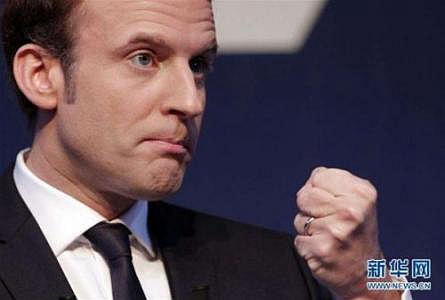Macron shows how to deal with Trump
- By Sumantra Maitra
 0 Comment(s)
0 Comment(s) Print
Print E-mail China.org.cn, May 24, 2018
E-mail China.org.cn, May 24, 2018

French President Emmanuel Macron's visit to Washington D.C. signifies a changing reality, and a redrawing of the world order as we know it post 1945. France is the U.S.'s oldest ally. France was the only country to help the U.S. gain independence from the British. But over time, the Anglo-American alliance began to form the bedrock of Western political order. Especially after 1945, as the United States turned into a global hegemon, with the shrinking British Empire acting initially as an equal and eventually as the primary ally to establish what we know as the liberal order. The French, on the other hand, proud of their history as an independent great power, chose to stay away from NATO under de Gaulle and took an independent approach to nuclear deterrence. British nuclear deterrence was meanwhile tied to the United States. That seems to be changing, as post-Brexit France recovers its position as the primary ally of the United States. Macron's diplomacy seems to solidify that trend.
Macron and Trump are in no way similar. Macron is broadly progressive, and value oriented. He thinks of France as a nation that needs to shed its past and accept its position as the new leader of the Western world. With British isolationism, Russian revanchism and German caution, it is the ideal moment for France to reform itself as a great power and take the mantle of Western leadership. Macron talks about human rights, about protecting democratic values across the West, about interventions, about climate change, about reforming the EU and is open about dealing with China and the transfer of technology. Macron's policy is, in a way, a continuation of those of Bush, Blair, Cameron and Sarkozy.
Trump is a break from that. Trump is mercantile, understands trade as zeros sum and doesn't care about human rights. Trump also doesn't care about the Wilsonian burden of America as the great global guarantor of goods and freedom. Trump is open to negotiating with regimes which have been considered toxic by other American administrations, and Trump can be persuaded to have a deal as long as there is tangible profit for American taxpayers and American business. Trump is of course no bleeding pacifist, as his unilateral use of military force displays. But Trump doesn't care about ideology promotion and is reluctant and much more practical about interventions. The fascination that exists between Trump and Macron is therefore one of charisma. Trump is charmed by Macron and his decisive ways of sorting out problems, something that the British – with their parliament and their cautions – lacks. Macron has a freeing effect on Trump.
This is understandable as French foreign policy is solely the remit of the French government, without any influence of domestic politics. Something which neither Britain, due to its political culture and system, nor Germany, due to its history, can afford. It is also dangerous, as Trump can be easily persuaded, which means he can be also easily manipulated. The last two times the French persuaded the Americans into anything led to disaster. Libya is the primary example of this. Macron might be able to persuade Trump on some unilateral and utopian and foolhardy adventure in Middle East for his own ideas of democracy promotion, but the outcome of that is already evident from the last fifteen years.
But what is extraordinary about this is how Macron seems to be dealing with Trump: A sense of grandeur and a tinge of importance, mixed with charm and charisma and flattery. And most importantly, showing Trump that his and American interests are unharmed. I don't know if Macron will be able to persuade Trump to stick to the Iran nuclear deal. If he can, it will be something like a miracle. But there's a lesson to be learned, for other countries here.
Sumantra Maitra is a columnist with China.org.cn. For more information please visit:
http://www.china.org.cn/opinion/SumantraMaitra.htm
Opinion articles reflect the views of their authors only, not necessarily those of China.org.cn.






Go to Forum >>0 Comment(s)